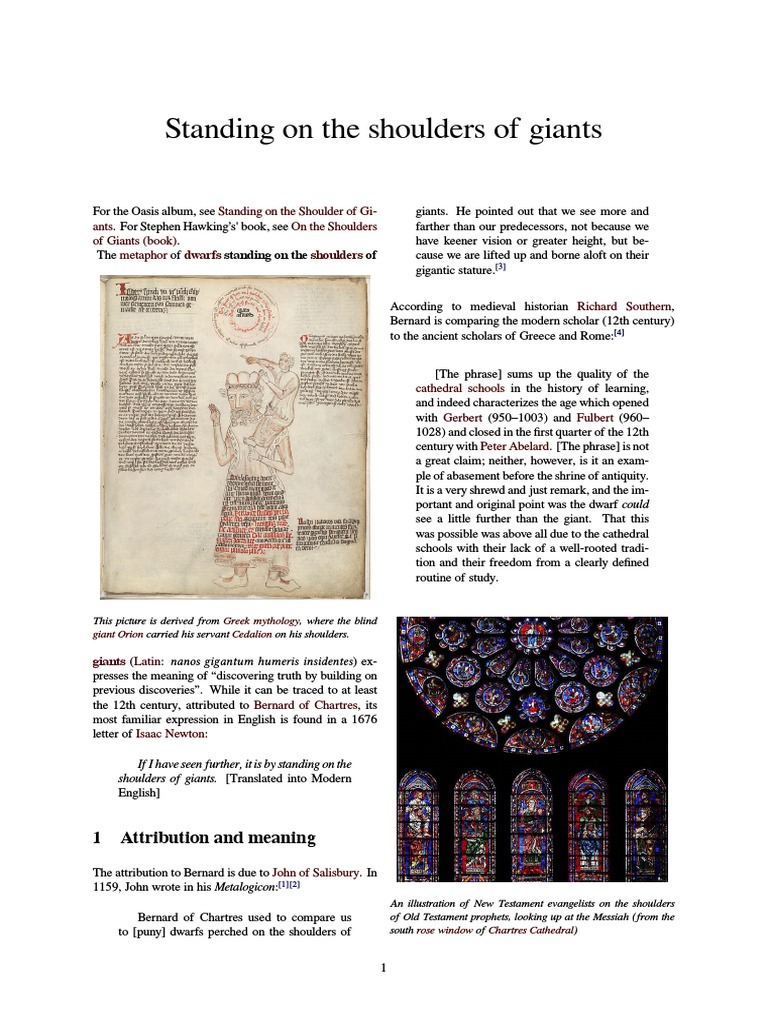Dr. Daniel C. Jordan’s profound insights into the Bahá’í teachings serve as a resonant reminder of the rich intellectual and spiritual heritage that underpins this vibrant faith. Drawing upon the metaphor of “standing on the shoulders of giants,” Jordan articulates a vision where contemporary understanding is deeply rooted in the wisdom of past thinkers, philosophers, and visionaries. This interplay of historical context and modern interpretation reshapes our perception of knowledge, illumination, and the shared human experience.
The metaphor itself conjures an image of ascending towards enlightenment, facilitated by those whose contributions laid the groundwork for our current trajectory. In the Bahá’í context, this metaphor is particularly poignant, as the teachings of Bahá’u’lláh elegantly combine elements of past religious traditions while also pioneering new pathways for spiritual evolution. The Bahá’í Faith does not merely inherit past wisdom; it seeks to transcend it, thereby empowering followers to contribute to an ongoing dialogue that enriches global understanding.
One of the foundational concepts in Bahá’í teachings is the principle of the oneness of humanity. This tenet requires that believers recognize the shared origins of all peoples. Dr. Jordan elucidates how this principle compels individuals to consider their role in the greater tapestry of human society—essentially, standing not on isolated peaks of individual accomplishment, but rather on the expansive shoulders of collective endeavor. Each human contribution, whether small or grand, signifies an accumulation of wisdom which is vital for the progress of civilization.
Moreover, the principle of progressive revelation is integral to understanding the dynamic nature of Bahá’í teachings. This concept posits that divine truth is revealed incrementally through a succession of prophets and messengers across diverse epochs. It offers an intriguing perspective on the evolution of religious thought and encourages an openness to learn from historical revelations. Dr. Jordan emphasizes that recognizing the interconnectedness of various faiths fortifies one’s spiritual foundation while simultaneously acknowledging the giants of moral and intellectual thought who have come before.
Acknowledging these ‘giants’ not only enriches personal belief but also challenges Bahá’ís to engage in critical dialogue. The contemporary believer is tasked with unearthing the wisdom contained in religious texts, philosophical discourses, and scientific advancements that have shaped humanity. Jordan’s exploration urges the faithful to cultivate a mindset that seeks knowledge from every quarter—an ethos that enhances the vigor of the Bahá’í community.
Education emerges as another cornerstone of Dr. Jordan’s discourse. The Bahá’í teachings champion universal education as a means to nurture not only the intellect but also the moral fiber of society. A well-rounded education is viewed as the scaffolding upon which individuals can build their understanding of the world, empowering them with the tools to make discernible impacts. This idea resonates deeply within the Bahá’í community where mentorship and fellowship are fundamental values. The experience and knowledge of past thinkers should serve as an enduring compass guiding the educational pursuits of future generations.
In examining the notion of service, Dr. Jordan captivates the reader with his insistence that action rooted in love and altruism is a direct expression of faith. The teachings emphasize that true devotion is not merely a personal, introspective journey but is fundamentally collective—a calling to uplift the world around us. Each act of kindness, each commitment to social justice, is viewed as part of a larger narrative that honors the giants whose wisdom has propelled human advancement. It is a poignant reminder that service transcends individual aspirations, intertwining with the aspirations of humanity itself.
Environmental stewardship is yet another noteworthy dimension of Dr. Jordan’s exploration of Bahá’í teachings. He articulates the urgent need for a harmonious relationship between humanity and the natural world, underscoring a responsibility stemming from our collective heritage. The concept of guardianship extends beyond the self, encompassing the obligation to nurture the Earth—a legacy handed down to us by those who have grappled with the moral implications of resource management and ecological balance. The Bahá’í perspective aligns with contemporary environmental ethics, urging followers to embody the principles of sustainability and engaged citizenship.
Dr. Jordan’s reflections ultimately navigate towards a powerful conclusion: standing on the shoulders of giants is not merely an acknowledgment of past contributions, but a call to action. The giants of intellectual and spiritual history offer not only knowledge but also inspiration. As individuals in a rapidly changing world, Bahá’ís are challenged to transcend their historical context, infuse it with contemporary insights, and actively partake in the ongoing process of human evolution.
In synthesizing the traditional with the modern, the Bahá’í teachings as articulated by Dr. Daniel C. Jordan invite believers and seekers alike to engage deeply with their faith and the world around them. The commitment to unity, progress, education, service, and environmental stewardship frames a holistic approach to spirituality that remains both profoundly relevant and intricately connected to the giants who have paved the way. It is a clarion call to all—an opportunity to stand tall, inspired not only by the heights reached before but also by the heights yet to be achieved through collective human endeavor.
